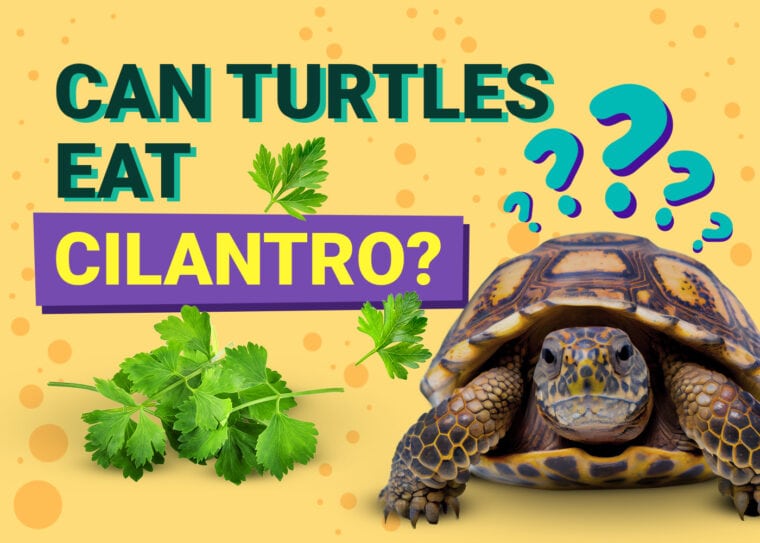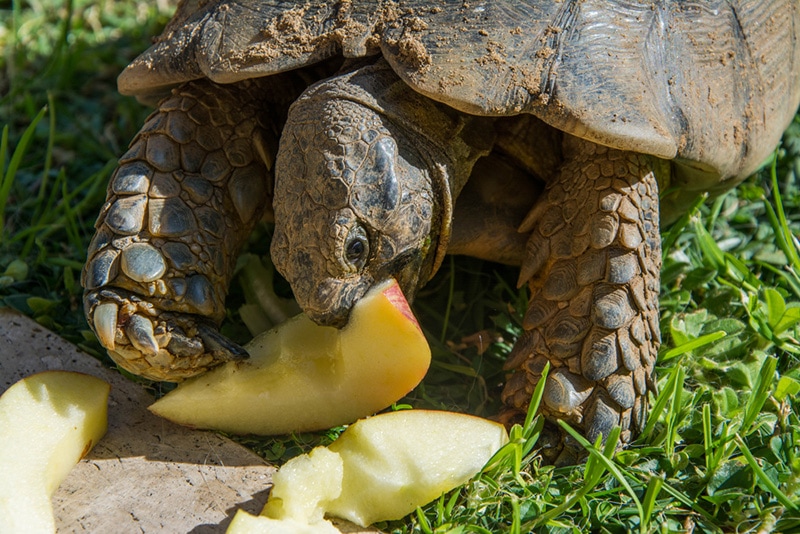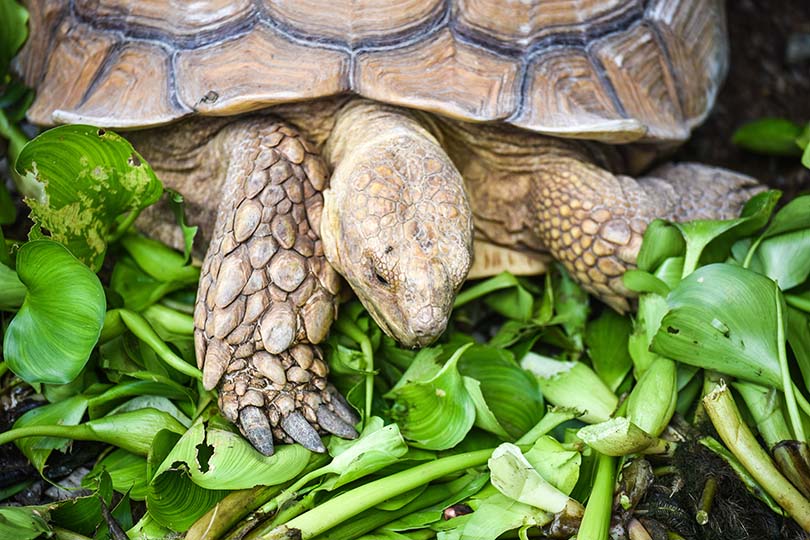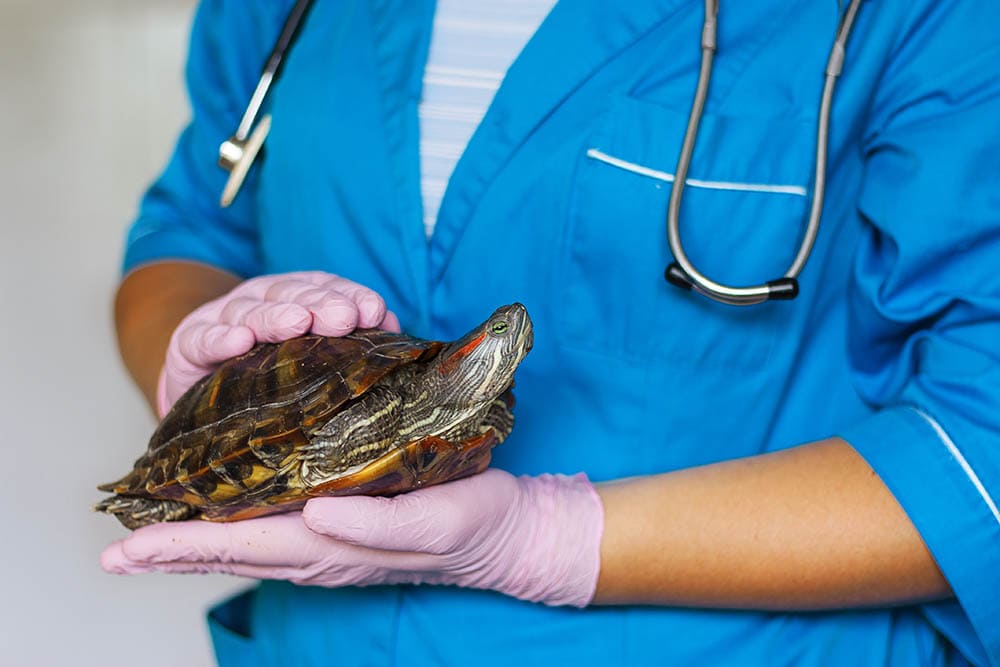
Cilantro is a versatile green herb with an array of health benefits to its name, but is it something your turtle can safely munch on? Good news—most turtle species can eat cilantro, but it should only make up a small part of the very varied diet that turtles need and be fed only in moderation. The word turtle is not species-specific and you need to know what kind of turtle you have to ensure that you are feeding it correctly. In this article, we are mainly referring to aquatic turtles.
Without further ado, let’s dive (pun intended) into the world of turtle nutrition.
Is Cilantro Good for Turtles?
Cilantro contains vitamins A, K, and C. Vitamin A is an especially important nutrient for turtles since they’re at risk of vitamin A deficiency, but cilantro should only make up a tiny bit of the turtle’s overall diet, so they’ll reap most of their nutrition from a variety of other plant-based materials (more on this further down).
Moreover, too much cilantro could upset your turtle’s stomach, so stick to including just a little bit in their diet now and again. In any case, lots of variety is best for turtles! Feed cilantro washed and broken up, and you might want to mix it in with their other vegetables.

A Turtle’s Diet
The majority of turtle species, including Box Turtles, Painted Turtles, Pond Turtles, and Red Sliders, are omnivorous, which means they consume both plant and animal material. Fortunately, the ratio is pretty clear-cut—the average turtle’s diet should consist of around 50% plant-based foods and 50% animal-based foods.
However, it’s important to note that juvenile turtles (up to the ages of 4–6) are more carnivorous, relying mostly on animal-based foods, though you can still feed them plant-based foods as well. By contrast, older turtles tend to become more herbivorous, preferring plant matter over meat. For these reasons, it’s important to take note of your turtle’s age and adapt the diet as necessary.
It’s also good to bear in mind that different turtle breeds may have slightly different nutritional needs, so we recommend talking to a vet about what kind of diet would suit them best.
What to Feed Turtles
Though nutritional requirements can vary somewhat by breed and age, an omnivorous adult turtle will typically eat a combination of turtle pellets, animal proteins (including live prey like crickets), veggies, and a small amount of fruit. It’s important to vary the food items you offer your turtle to keep them interested and allow them to reap a range of nutritional benefits.

Animal-Based Foods for Turtles
If your vet agrees that it’s suitable for your turtle’s age range, in addition to commercial pellets, you can feed your omnivorous turtle a range of other animal-based proteins, including silkworms, mealworms, grasshoppers, crickets, moths, slugs, wax worms, and hard-boiled eggs.
You can also offer live prey bought from stores (don’t acquire these from the wild), though this may vary slightly depending on the type of turtle you have. Aquatic turtles, for example, eat fish, so you can offer store-bought “feeder fish”. Be careful with these, though, as there is a chance they may carry parasites.
For this reason, and due to the risk of nutritional deficiencies (especially vitamin B1) if a turtle eats too much fish, it’s best to keep them as an occasional treat for your aquatic turtle.
If your turtle is a juvenile, the part of its diet made up of animal proteins should not exceed two-thirds of the diet as a whole. When the turtle becomes an adult, the ratio of meat to plant-based sources is typically about 50/50.
Plant-Based Foods for Turtles
Dark, leafy greens are the best kinds of plant-based materials to feed turtles and should make up most of their vegetable allowance. Options for vegetables and herbs turtles can eat occasionally include (but aren’t limited to) cilantro, broccoli, bell peppers, collard greens, mustard greens, parsley, kale, alfalfa hay, bok choy, red or green cabbage, watercress, green beans, and clover.
Swiss chard, beet greens, and spinach are also okay but should be given only occasionally due to the risk of nutrient absorption issues. Mustard greens, cabbage, and kale should also be fed in moderation due to the risk of hypothyroidism. Avoid feeding iceberg or head lettuce, as these aren’t nutritionally rich.
Other options include (but are not limited to) carrots, sprouts, okra, cucumber, peas, corn, mushrooms, and asparagus. Safe fruits to feed turtles (though these should only make up a small percentage of the diet) include kiwis, peaches, apples, bananas with skin, star fruit, and melons.
On a final note, if you have an aquatic turtle, make sure any vegetables or fruits you offer can float and don’t forget to do regular spot checks to get rid of leftover food that could spoil in the water.

Minerals and Vitamin Supplements
Veterinarians commonly advise including a light dusting of calcium powder with your turtle’s vegetables a few times per week. Aquatic turtles may benefit from calcium blocks or cuttlebones.
A multivitamin-mineral powder may also be beneficial and can be offered on a weekly basis. Again, we recommend speaking to a vet about this to ensure they get the right amount of supplements.
Final Thoughts
To recap, turtles can eat cilantro now and then in moderation, but their diet should include a wide variety of vegetables and a much smaller amount of fruit. Animal-based proteins are also important for the omnivorous species.
If you’re a new turtle parent, we recommend meeting with an exotic vet to discuss the best kind of foods and supplements, especially since the turtle’s needs may change somewhat as they grow and develop, and the dietary requirements can be breed-specific.
See also:
Featured Image Credit: Light Hound Pictures, Shutterstock








